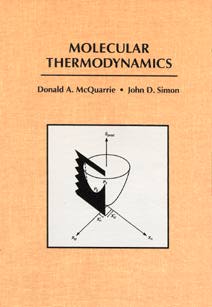
Molecular Thermodynamics
Evolved from McQuarrie and Simon's best-selling textbook, Physical Chemistry: A Molecular Approach, this text focuses in on the thermodynamics portion of the course. Although many of the chapters in Molecular Thermodynamics are similar to chapters in the larger physical chemistry text, new material has been added throughout along with three entirely new chapters on "The Energy Levels of Atoms and Molecules," "Thermodynamics of Electrochemical Cells," and "Nonequilibrium Thermodynamics."
View Solutions ManualSummary
Evolved from McQuarrie and Simon’s best-selling textbook, Physical Chemistry: A Molecular Approach, this text focuses in on the thermodynamics portion of the course. Although many of the chapters in Molecular Thermodynamics are similar to chapters in the larger physical chemistry text, new material has been added throughout along with three entirely new chapters on “The Energy Levels of Atoms and Molecules,” “Thermodynamics of Electrochemical Cells,” and “Nonequilibrium Thermodynamics.” The text also includes five short “MathChapters,” each with a special set of problems that will help students review and summarize the mathematical tools required to master the material. Worked examples and chapter-ending problems with solutions are also included throughout the book.
Resources
Table of Contents
Preface
1. The Energy Levels of Atoms and Molecules
MathChapter A: Numerical Methods
2. The Properties of Gases
MathChapter B: Probability and Statistics
3. The Boltzmann Factor and Partition Functions
MathChapter C: Series and Limits
4. Partition Functions and Ideal Gases
MathChapter D: Partial Differentiation
5. The First Law of Thermodynamics
MathChapter E: The Binomial Distribution and Stirling’s Approximation
6. Entropy and the Second Law of Thermodynamics
7. Entropy and the Third Law of Thermodynamics
8. Helmholtz and Gibbs Energies
9. Phase Equilibria
10. Solutions I: Liquid-Liquid Solutions
11. Solutions II: Solid-Liquid Solutions
12. Chemical Equilibrium
13. Thermodynamics of Electrochemical Cells
14. Nonequilibrium Thermodynamics
Answers to Numerical Problems
Illustration Credits
Index
Reviews
“The writing is exceptionally clear, and explanations are lucid and sound.”
-The Chemical Educator
“This book represents a sort of down-sized version of the Magnum Opus by the same authors: Physical Chemistry, A Molecular Approach. For those readers who are already familiar with this book and like it, I can say that: this one gives you basically the same goodies but in a more digestible form…McQuarrie is emerging as one of the the best writers on undergrad thermodynamics and statistical mechanics around…”
-Journal of Statistical Physics
“An extremely large number of worked examples and end-of-chapter problems supplement this excellent book.”
-Science & Technology
